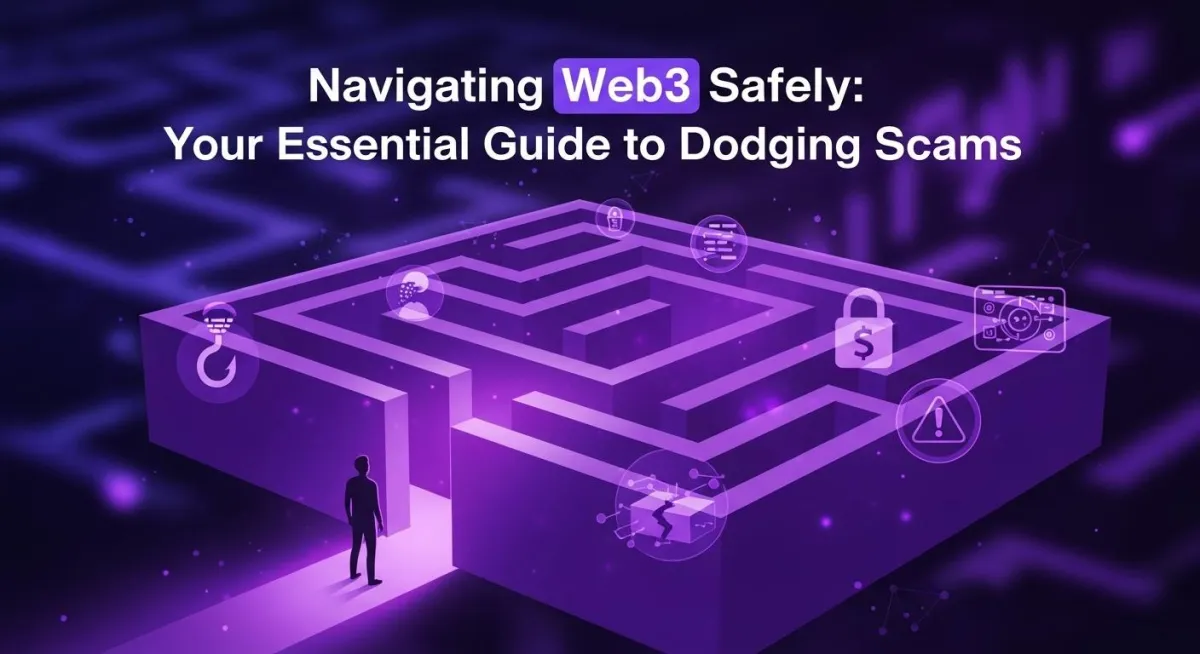
Is Web3 safe? How do I avoid getting scammed?
Introduction
Web3 is exciting, no doubt.
Ownership, freedom, decentralized everything… it feels like stepping into the future with your chest out and your wallet full.
But if we’re being honest?
Some days, Web3 feels less like the future and more like a neighborhood where everyone is building skyscrapers and thieves are quietly learning how to pick digital locks.
I’ve seen people win big…
…and I’ve seen people lose everything because of one wrong click.
So this isn’t “another security article.”
This is a real, grounded guide to staying safe, written the way I wish someone had explained it to me when I first entered the space.
Understanding the Web3 Reality: The Tech Is Strong, the Humans Are the Weak Point
Blockchain technology itself is solid cryptography doesn’t lie.
But the apps built on top of it? The websites, smart contracts, Discord links, “support staff” DMs, and human behavior?
That’s where trouble starts.
Web3 flips responsibility on its head.
There’s no “Sorry sir, our system glitched, here’s your money back.”
There’s no “Recover my password.”
If you lose your keys or sign the wrong transaction, that’s it.
It’s empowering, but it’s also a lot of pressure, especially for newcomers.
The Scams You Will Eventually See (If You Haven’t Already)
1. The “Click Here for Free Airdrop” Trap
Let me paint a picture:
You see an “official” announcement.
The design? Clean.
The timing? Perfect.
The rewards? Generous, too generous.
You click the link, connect your wallet…
…and suddenly, the only airdrop you receive is silence from your emptied wallet.
Wallet drainers today are smooth. One wrong signature, and you’re wiped.
2. Rug Pulls and Projects That Disappear Like Snapchat Messages
You know the vibe:
Big promises, hyped community, explosive launch…
then one day:
Telegram? Deleted.
Twitter? Gone.
Liquidity? Vanished.
The “team” just sold everything and dipped.
I’ve seen people lose months of savings to a project that looked “legit” until it wasn’t.
3. Fake Support Staff That “Just Want to Help”
You post one error message online…
and five minutes later, someone slides into your DMs:
“Hello dear user, I am from the official support team.”
If you trust them, you’ll be sending your seed phrase to someone sitting in an internet café with your life savings on their screen.
4. Smart Contracts With Hidden Teeth
Sometimes, the real scam is the code you can’t see.
You approve a simple transaction…
…not knowing you just granted unlimited access to your tokens.
And days later, when the attackers drain you, you don’t even know which approval caused it.
So, How Do You Protect Yourself? Here’s the Uni-fy Way: Simple, Practical, No-Nonsense
1. Secure Your Keys Like Your Life Depends On It
Because honestly… in Web3, it does.
Never share your seed phrase
Never type it into a website
Never screenshot it
Get a hardware wallet, seriously
If your assets matter to you, store them offline.
2. Double-Check Everything (Then Check It Again)
Here’s a rule:
If a link comes from Discord, Telegram, or random DMs, assume it’s a scam until proven otherwise.
Bookmark official sites.
Verify from multiple sources.
Trust slow decisions, not fast offers.
3. Don't Approve What You Don’t Understand
Every time you sign something, ask yourself:
“Does this make sense? Do I trust this dApp?”
And every few weeks, revoke old permissions.
4. FOMO Is the Enemy
Scammers love it when you rush.
A Web3 red flag is anything that starts with:
“Limited time”
“Guaranteed profit”
“Exclusive early mint, hurry!”
Breathe.
Research.
Walk away if it feels off.
5. Stay Informed, Because Web3 Evolves Daily
Follow credible security accounts.
Join communities that actually care.
Ask questions, no shame in learning.
Knowledge is the strongest wallet protection you’ll ever own.
So Where Does Uni-fy Come In?
A big part of the Web3 struggle is that everything feels scattered, unsafe, and overwhelming.
Uni-fy is stepping into that gap — building identity tools and secure wallet flows that make your Web3 journey feel more structured and less chaotic.
Instead of putting all the responsibility on you alone, Uni-fy creates an ecosystem where:
your data is protected
your transactions feel safe
your identity is verified
and your Web3 experience is simpler
It’s like having guardrails without losing the freedom that makes Web3 beautiful.
Final Thoughts: Web3 Isn’t Dangerous Ignorance Is
Scammers will always exist.
But your awareness can be stronger than their tactics.
You don’t need to be paranoid.
You just need to be intentional.
Slow down.
Confirm things.
Secure your keys.
Learn from the community.
And build with platforms like Uni-fy that put safety at the center.
Web3 is powerful.
But power without knowledge is a risk.
With the right habits, you won’t just survive Web3
you’ll thrive in it.
